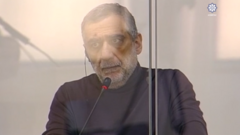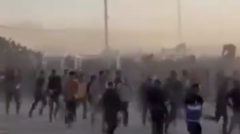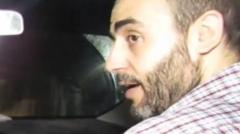**In a dramatic twist of fate, Ruben Vardanyan, a billionaire and former de facto leader of Nagorno-Karabakh, is on trial for war crimes as Armenia and Azerbaijan move toward a historic peace agreement, raising concerns over his future and the implications for ethnic Armenians.**
**Azerbaijan's High-Stakes Trial: Vardanyan Faces Uncertain Future Amid Peace Deal Pressures**

**Azerbaijan's High-Stakes Trial: Vardanyan Faces Uncertain Future Amid Peace Deal Pressures**
**Exclusive insights into Ruben Vardanyan’s trial as Azerbaijan and Armenia try to finalize a peace deal while he battles war crime charges.**
Billionaire Ruben Vardanyan, a prominent figure in Armenia, is currently on trial in a military court in Azerbaijan, where he faces a staggering 42 charges including planning and waging war, mercenary activities, and terrorism. His trial is occurring amidst negotiations between Armenia and Azerbaijan over a historic peace deal aimed at resolving the longstanding Nagorno-Karabakh conflict. Despite his wealth, Vardanyan’s financial resources appear powerless in the face of potential life imprisonment.
At 56, Vardanyan, a well-known Russian-Armenian entrepreneur, once thrived in the business sector, gaining recognition as the founder of Russia's inaugural private investment bank and an influencer in the education realm with the establishment of a prestigious management school, "Skolkovo." However, his career took a drastic turn following Azerbaijan's military offensive in September 2023, when he took on the role of a leader for ethnic Armenians in Nagorno-Karabakh, an area historically linked to Armenia but recognized as part of Azerbaijan. His government viewed this as an illegal act.
Vardanyan’s decision to relocate to this contentious territory was met with severe backlash as Azerbaijan intensified its military actions in Nagorno-Karabakh. The region has experienced acute food shortages since Azerbaijan blockaded its sole route to Armenia, igniting an outcry from the local population. Following the military operation, which led to the fall of Nagorno-Karabakh within one day and forced over 100,000 ethnic Armenians to flee, Vardanyan became a target for Azerbaijani authorities. He was ultimately arrested while attempting to escape to Armenia.
Vardanyan’s trial, alongside 15 other former Armenian leaders, is criticized as a façade, ruling out any legitimate judicial process, especially with reports of torture and inadequate legal representation while in custody. His defense claims these proceedings are little more than political show trials aimed at stifling dissent among Armenians regarding their rights in Azerbaijan.
Despite his predicament, the unfolding peace talks between Armenia and Azerbaijan have completely sidelined the plight of Vardanyan and other ethnic Armenian leaders on trial. Critics argue that this oversight in the peace agreement negotiations reflects a broader disregard for human rights and the welfare of victims in the region, particularly as the details of the pact remain undisclosed.
Armenian lawmakers face mounting scrutiny over their handling of Vardanyan's situation. However, some believe the resolution of such contentious issues should occur in tandem with the peace treaty, highlighting the complexity of balancing national interests with humanitarian concerns.
Vardanyan himself has warned that his trial transcends personal culpability, representing a broader struggle for the rights and recognition of all Armenians. He has issued a compelling message to supporters asserting that the outcome of his case would reverberate across the Armenian community, emphasizing, "This is not the end of the story, not the end of the conflict; it's merely the next stage."
As Vardanyan returns to court soon, there’s an atmosphere of unease among his supporters, who fear that any focus on a peace agreement may further jeopardize his situation and the unresolved plight of ethnic Armenians in Nagorno-Karabakh.


















